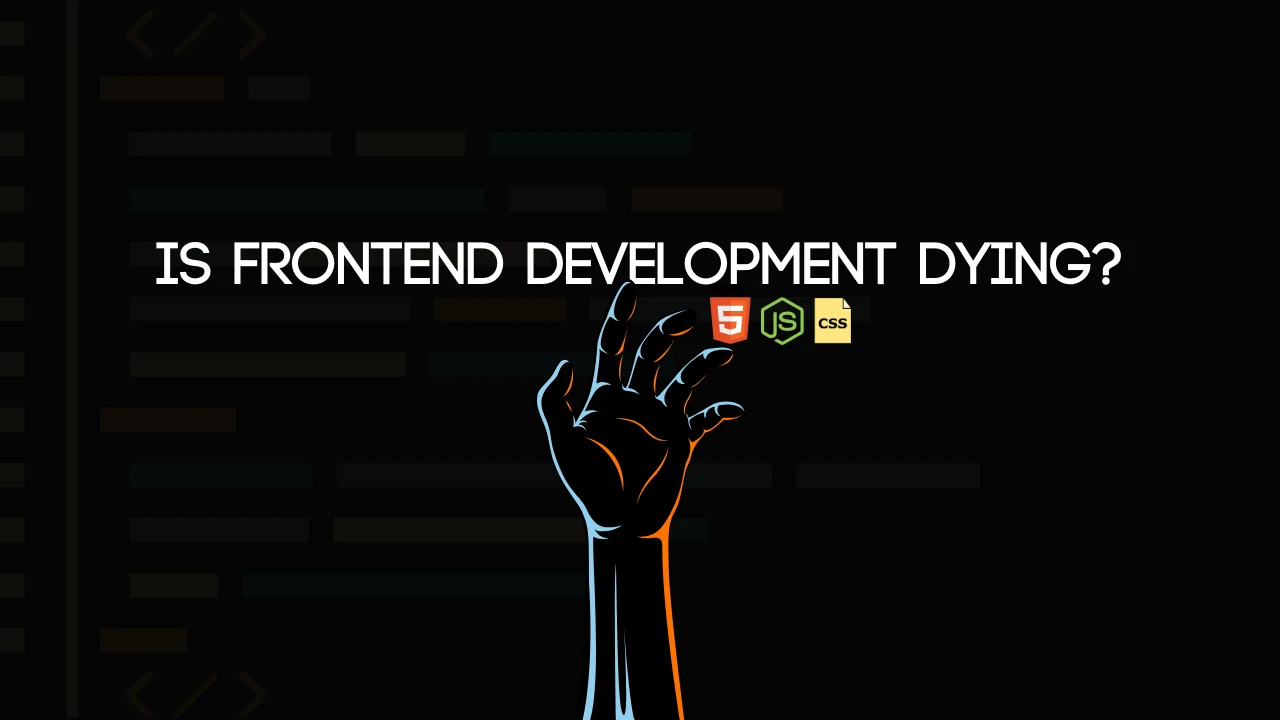
Is Frontend Development Dying? Exploring the Future
In the past, front end development was considered one of the most demanding skills in the technology world. From building static HTML pages to designing complex, interactive, and user-friendly web applications, front-end developers have shown their magical skills in the tech world. But, in recent years due to the rapid rise of Artificial Intelligence (AI), low code/ no-code platforms like Webflow, Wix, and Bubble as well as automation tools, conservations in the technology world have been louder around a controversial question: Is frontend development dying?
This question sparks debate among developers, students, and industry leaders. Some believe the role of frontend developers is being overshadowed by automation, while others argue that frontend is simply evolving into something bigger and more complex. In this article, we’ll explore the reasons behind the perception that frontend is “dying,” analyze how the field has evolved, and look into the future of frontend development.
Why Some Believe Frontend Development Is Dying
1. Growth of Low-Code/No-Code Platforms:
Platforms such as Webflow, Wix, and Bubble have democratized website and application creation. By enabling non-technical users to design functional websites with drag-and-drop tools, these platforms reduce the demand for simple, entry-level frontend work. For small businesses and startups, hiring a developer often appears unnecessary when an affordable, automated solution is readily available.
2. AI-Powered Development Tools:
AI-driven solutions like GitHub Copilot and ChatGPT can generate frontend code in seconds. Tasks that once required manual coding can now be partially automated, leading many to believe that traditional frontend work may be on the verge of redundancy.
3. Oversupply of Developers:
The relatively low barrier to entry in frontend development has drawn a vast number of learners from across the globe. This surge in junior-level talent has saturated the job market, intensified competition and reinforcing the impression that opportunities are shrinking.
4. Shifts Toward Backend and Infrastructure:
As businesses increasingly emphasize cloud computing, cybersecurity, and backend scalability, frontend is sometimes perceived as less critical. This shift in focus contributes to the narrative that the front end is losing its prominence.
The Evolution of Frontend Development
Contrary to the belief that frontend is dying, the field has undergone a remarkable evolution.
1.From Static Pages to Interactive Applications:
In its early days, frontend was limited to static HTML and CSS pages with minimal interactivity. Today, it powers complex applications capable of real-time updates, dynamic dashboards, and immersive user experiences.
2.The Emergence of Modern Frameworks:
Frameworks and libraries such as React, Angular, and Vue have redefined frontend development. They introduced component-based architectures, state management, and scalability, elevating frontend from basic webpage design to robust engineering practice.
3.User Experience as a Strategic Priority:
In today’s digital landscape, user experience (UX) serves as a crucial differentiator. Frontend developers are no longer responsible only for aesthetics; they are instrumental in creating seamless, intuitive, and inclusive interfaces that drive business success.
4.Integration with Backend and Cloud Ecosystems:
Frontend is increasingly intertwined with backend systems (Django, Nuxt, Remix, ...), APIs, and cloud infrastructures. Progressive Web Apps (PWAs), server-side rendering (SSR), and microfrontend architectures demonstrate how the role of frontend developers has expanded beyond presentation into engineering and systems integration.
Why Frontend Development Remains Essential
1.Every Technology Needs a User Interface:
Regardless of how powerful a backend system may be, users require a way to interact with it. From enterprise dashboards to consumer-facing applications, frontend serves as the gateway between human and machine.
2.Demand for Specialized Skills:
While the market may be crowded with beginners, experienced developers who master advanced concepts—such as performance optimization, accessibility, and responsive design—remain highly sought after. Businesses consistently invest in professionals who can deliver quality at scale.
3.Emerging Technologies Expanding the Field:
Advancements like Web-Assembly, Web3, AR/VR, and 3D frameworks such as Three.js and Babylon.js are reshaping the future of frontend. These developments expand opportunities rather than diminish them.
4.The Human Element of Creativity:
Although AI can help with writing code, there are many things that only humans can understand and do it in a better way. Front-end development is as much about understanding human behavior as it is about writing code. This inherently human element ensures its continued relevance.
The Future of Frontend Development
1. AI as a Collaborative Tool:
AI will not eliminate frontend developers; it will enhance their productivity. AI takes care of boring, repetitive tasks so developers can focus on solving problems, being creative and building new ideas. Those who embrace AI as a partner will gain a significant edge.
2. Focus on Accessibility and Inclusivity:
The future of frontend lies in building experiences accessible to all users, including those with disabilities. Due to more focus of government and organizations on digital accessibility, skilled developers are still in demand.
3. The Rise of Full-Stack and Hybrid Roles:
With frameworks like Next.js, Nuxt, and Remix, frontend developers are expanding into backend territory, creating a new generation of full-stack engineers. This trend emphasizes versatility and continuous learning as key professional assets.
4.Immersive and Multimodal Experiences:
The web is moving beyond flat screens. Voice interfaces, AR/VR environments, and even brain-computer interfaces represent the next frontier. Frontend developers will be central to designing and engineering these immersive experiences.
Conclusion:
So, is frontend development dying? The simple answer is no—it is evolving. While automation and AI tools may replace repetitive tasks, the need for creative, skilled developers who understand users will never disappear. Frontend is moving beyond just “making websites pretty.” It’s becoming a critical field that shapes how we interact with digital technology in our daily lives.
Wajahat Murtaza
FounderShare this Post
Was this blog helpful?
Your feedback is anonymous and no login is required.
Thank You for Your Feedback!
Your feedback helps us improve and serve you better.
You Already Submitted Feedback!
We appreciate your input.
Similar Posts
-
Vibe coding: Your roadmap to becoming an AI developer - The Pyzit Blog
-
Developer Tools Comparison: Code Editor, DevKit, PyCrypt, OG-META
-
Unlock Your Development Potential with the Pyzit Developer Platform
-
Free Developer Tools: Code Editor, DevKit, PyCrypt, OG-META
-
A Fast, Free, and Powerful Online Playground for HTML, CSS & JavaScript

